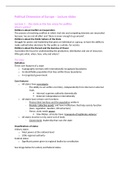College aantekeningen
The Political Dimension of Europe - Lecture Slides 1-6
- Instelling
- Haagse Hogeschool (HHS)
This document includes the information of lectures 1-6 of the course The Political Dimension of Europe, for the studies European Studies at The Hague University of Applied Sciences.
[Meer zien]




